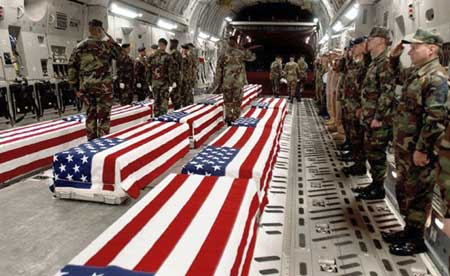3000th US soldier dies in Iraq
(Reuters)Updated: 2007-01-01 08:57
WASHINGTON - Saddam Hussein was buried in the dead of night in his native village on Sunday, prompting an outpouring of sectarian anger as the 3,000th American soldier was reported to have died in Iraq.
 Coffins of U.S. military personnel are offloaded at Dover Air Force Base in Dover, Delaware in this undated file photo. The U.S. military death toll in Iraq has reached 3,000 on December 31, 2006, an unwelcome milestone for President George W. Bush who is searching for a way to turn around the unpopular war even if it means sending more troops. The Pentagon tightly restricts publication of photographs of coffins with the remains of U.S. troops and has forbidden journalists from taking pictures at Dover Air Force Base in Delaware, the first stop for the bodies of troops being sent home. [Reuters] |
The Web site, www.icasualties.org, on Sunday listed the death of Spec. Dustin R. Donica, 22, on December 28 as previously unreported and said that 3,000 American military personnel had now died.
The mark was reached as Bush weighs options, including a short-term increase in forces of up to 30,000, to help control the deteriorating situation in Iraq where daily violence plagues Baghdad and much of the country.
"Every loss is regretted and there is no special significance to the overall number of casualties," said Pentagon spokesman Lt. Col. Mark Ballesteros.
Analysts called 3,000 deaths a major personal tragedy but said it had limited political and military significance. Anti-war activists vowed to use the milestone as a catalyst to press for the withdrawal of U.S. forces.
U.S. and Iraqi troops have failed to establish security in Iraq's capital, despite concentrating efforts there, as battles among Sunni and Shi'ite Muslim militias, insurgents and government forces as well as al Qaeda fighters rage.
Bush, at his ranch in Crawford, Texas, mourned the death of the 3,000th U.S. soldier, the White House said, but cautioned war-weary Americans that no quick end was in sight to the fight against terrorism.
BUSH UNDER PRESSURE
The president has been under pressure to change course in Iraq amid widespread public and political discontent. He is expected to unveil his new strategy early next month but has rejected the idea of a timetable for pulling out the 134,000 U.S. troops now in the country.
"The president believes that every life is precious and grieves for each one that is lost," said White House spokesman Scott Stanzel. "He will ensure their sacrifice was not made in vain."
December is the deadliest month for U.S. forces in the past two years, with 111 fatalities so far. Tens of thousands of Iraqis have died in the almost four-year-old war.
Bush has shown little appetite for dramatic changes even after his Republican party's defeat in November elections -- widely regarded as a referendum on his Iraq policy -- which gave control of Congress to Democrats.
Despite the execution of former Iraqi president Saddam Hussein on Saturday, Bush said violence in Iraq would not end and warned more U.S. sacrifices lay ahead. The United States would be "fighting violent jihadists" for years to come, the White House said.
Anthony Cordesman, a military expert at the Center for Strategic and International Studies, said the political problems inside Iraq and the incoming Democratic Congress spell bigger trouble for Bush than the 3,000 milestone.
"There is no silver bullet," Cordesman said. "The problem is, however, the current strategy simply cannot work. By the time it (the war plan) comes out, Congress comes into session, no one is going to remember the number 3,000."
United for Peace and Justice, a coalition of more than 1300 groups throughout the United States who have joined together to protest the war, said it was planning a march in Washington on January 27.
"We must bear witness to this tragic milestone," the group said on its Web site. "And ... we must remind others that hundreds of thousands of Iraqi children, women and men have also died in this outrageous war and occupation."
Michael O'Hanlon, senior fellow at the Brookings Institution, said the 3,000 benchmark was not "that huge of a milestone" given what the country had been through already.
"It will however serve to dampen whatever slight boost Saddam's execution may have given the president and the American public," he said.
|
||
|
||
|
|